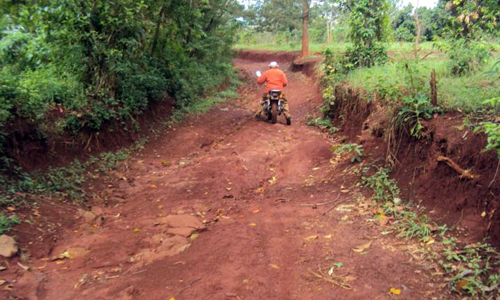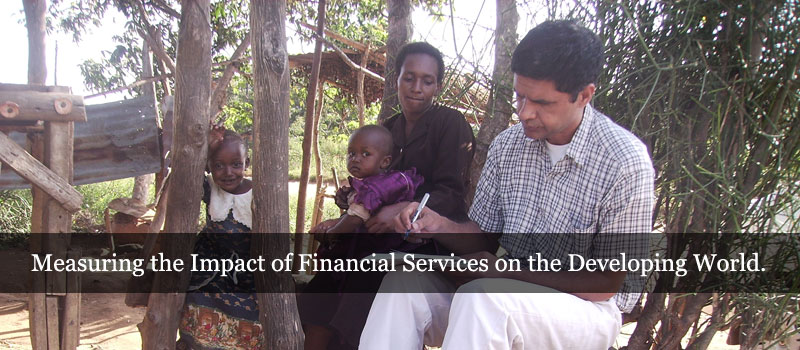The Emerging Effects of M-Pesa’s Rural Outreach at the Household Level
Michael Ferguson, Ph.D. Microfinance Opportunities. March 10, 2010.
Leaving behind the sizeable town of Murang’a in the Central Province of Kenya, the traveler may choose from several possible departure routes, depending on destination. One particular way is a paved but poorly- maintained road that winds though the hilly countryside, moderately populated by farmers who cultivate the valley floors and terrace the hillsides for maize planting.
Dodging potholes for perhaps 10 kilometers, past a churning brook that downstream becomes the primary water supply for Murang’a, one reaches an unmarked intersection with an unpaved road. To the left, that road stretches several kilometers up a steep hill, before offering another left turn and a short ascent into the small trading center of Muchungucha.
Muchungucha is a typical, small Kenyan trading center in many ways. It commercial core is perhaps 100 meters of shops and other businesses, where the basics of Kenyan life can be bought or sold. Most days, traders and local residents mill about the area, doing business and catching up on gossip. Two or three bare-bones pubs (an ubiquitous feature of even the smallest trading centers in this part of Kenya) provide refreshment and punctuate the local social scene. Muchungucha, in short, is an essential part of life and livelihood for the residents of the area and its surrounding villages.
M-PESA: A New Feature of Muchungucha’s Commercial Landscape
The features one observes in Muchungucha could be observed in nearly any small trading center across central Kenya—with one exception. Alongside its variety stores, grain traders, and pubs, another kind of business has appeared: an M-PESA agent. The versatile and phenomenally popular e-money service provides local residents with direct access to a full range of services including remittances, deposits, withdrawals, airtime transfers, and bill pay, all to and from clients’ cell phones.
For the most part, one finds M-PESA agents in Kenya’s cities and towns. That is what makes the rural locale of Muchungucha somewhat unusual. Having saturated the markets of Kenya’s cities and town, M-PESA’s parent corporation Safaricom is now making more distinct forays into rural areas, by way of agent postings like this one. And the effects of the rural outreach is just beginning to be observed and measured.
Emerging Effects of M-PESA’s Rural Outreach: An Illustrative Case
Several comprehensive studies are currently underway to examine the effects of M-PESA on Kenya’s cities, towns, and rural locations like Muchungucha. Among these is a 10-month Financial Diaries study being carried out by Microfinance Opportunities, which counts Muchungucha among its study sites. In these Financial Diaries participants, one can clearly discern some of the effects of the M-PESA outpost.

Consider the case of Peter. A senior local resident and retired school teacher, Peter draws his income these days primarily from two sources: 1) a maize milling business he operates at the top of Muchungucha’s commercial strip; and 2) remittances from relatives who live and work in Nairobi.
The remittances are the more significant income for him. In the first three months of the Financial Diaries study, he received 14 of them, totaling 21,215 KSH (US$283, not including withdrawal fees totaling between $5 and $8), as compared with income from maize milling that totaled 19,415 KSH ($259) over the same period. Nearly all of Peter’s remittances came from his children and a brother who live and work in Nairobi, several hours away. All were received locally in Muchungucha, and nearly all were “cashed out” immediately with the local M-PESA agent. The early months of the Financial Diaries study were planting months, and a substantial portion of this money went toward the purchase of farm inputs, applied to Peter’s maize field that helps feed his household through much of the year. Most of the rest helped meet day-to-day needs like grocery purchases.
What difference does it make to have the local M-PESA agent in a case like this? The more typical scenario for rural recipients of M-PESA remittances is to travel some distance, usually to the closest city or town, to withdraw cash from an agent. In Peter’s case, that would be the town of Murang’a, and we can consider that journey in the hypothetical.
To get to Murang’a, Peter must first descend the hill on which Muchungucha is located, about a 15-minute walk, to the paved road. He then catches a local mini-bus or matatu into town, a 20-30 minute trip. The fare? 50 KSH (US$0.67).
For the return, Peter must take a more expensive motor-taxi (a motorcycle rented out to passengers) at a cost of 100 KSH ($1.33). The reason is that the matatus do not ascend Muchungucha’s steep hill, but instead leave passengers on the side of the paved road at its base. Peter’s advanced age prevents him from making the ascent on foot, so he must rely on the moto-taxi to ferry him up.
Hence, in the absence of a local M-PESA agent, Peter faces transaction costs of 150 KSH (US$2) per remittance in transportation costs alone in order to get his cash. But other costs figure in as well. One can surmise that sometimes he would purchase a meal or snack in Murang’a to break up the trip—a reasonable estimate of that might be 75 KSH (US$1), perhaps every other visit.Also, the opportunity cost of time: the round trip can easily consume two hours or more. One can calculate the value of that time by considering the local rate for a day’s worth of casual labor—generally around 150 KSH (US$2). If eight hours comprise a day of casual labor, two hours can be valued at around US$0.50.
In sum, the estimated transaction costs involved in traveling to Murang’a to retrieve his cash total around US$3 per remittance. Peter received 14 remittances over three months, posing potential transaction costs of US$42—nearly 15 percent of the money he received. Instead, with the M-PESA agent nearly next door to his business, he can apply 15 percent more farm inputs to his fields. Or he can hire an entire month’s worth of casual labor (21 days) to assist him in planting his fields. Or he can spare himself some or all of the strenuous casual labor he might have to undertake himself to help make ends meet.
At the moment, Peter and the residents of Muchungucha are fortunate to have an M-PESA agent in their midst. However, cases like these will multiply if Safaricom continues its movement into Kenya’s rural areas, and the effects will continue to unfold and diversify.




